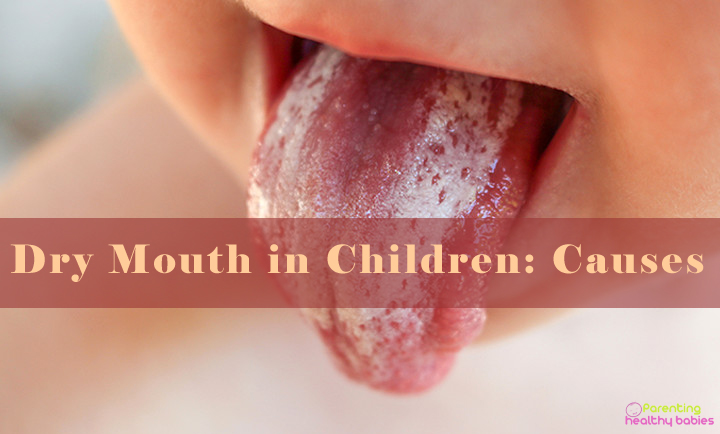Dry mouth also medically known by the name “xerostomia”, is a condition where the salivary glands of the mouth do not produce enough saliva to keep the mouth wet. Dry mouth or reduced saliva production can be a mere nuisance or have a huge impact on the health of your gums and teeth.
It is a commonly recognised disease in adults, but very little attention is paid to this medical condition in children. Since infants and children drool and produce more saliva, it is a common misconception that children do not suffer from dry mouth. But this is incorrect, dry mouth commonly occurs in children too, and there are several possible causes for it.
Potential Causes of Dry Mouth in Children
A normal child produces a saliva flow rate of more than 1.0mL/min which is greater than 0.7mL/min produced in adults. Dry mouth is a condition that occurs when the saliva flow rate at rest is less than the fluid loss rate from the mouth. Dry mouth generally occurs due to salivary hypofunction. There are several possible causes for dry mouth in children. Listed below are some of them.
1} Excess fluid loss
One of the most common causes of dry mouth in children is due to excess fluid loss. Excess fluid loss generally occurs when children are engaged in exertional activities or suffer from some diseases such as diarrhoea, food intolerances, Chrohn’s Disease and other eating disorders. In children suffering from these disorders, dry mouth is a common symptom.
2} Mouth breathing
Dry mouth generally occurs either by absorption of water by the oral mucosa or evaporation. Mouth breathing in children is a potential factor for oral dryness and is a common cause for dry mouth. The salivary film on the mouth becomes thin due to evaporation and results in dry mouth.
3} Medications
Medications that are prescribed for various childhood diseases can have a huge impact on the salivary glands and saliva output. Medications such as serotonin, paroxetine, clomipramine and fluvoxamine affect salivary flow rate and its pH. Medical disorders like OCD and ADHD can also cause severe xerostomia.
5} Chemotherapy
Haematological malignancies and tumours in children are generally treated by cytotoxic chemotherapy. Cytotoxic chemotherapy has a direct impact on the acinar cells of salivary glands. This impairs salivary output and decreases salivary volume in children causing dry mouth.
6} HIV Infection
HIV Infection is a common cause for dry mouth in children. Children suffering from HIV infection have affected parotid glands that gets enlarged resulting in dramatic reduction in salivary output. As the HIV infection progresses, there is further reduction in saliva causing a chronic mouth dryness.
7} Diabetes
Children suffer from both insulin dependent and non-insulin dependent type of diabetes. Diabetes causes polyuria and fluid loss which also impair salivary gland function. Hence, children suffering from diabetes constantly suffer from excess thirst due to dry mouth.
8} Sjogren’s syndrome
Sjogren’s syndrome is an autoimmune disorder that attacks the moisture producing glands in the body such as the salivary and sweat glands. Dry mouth is a common symptom in children suffering from thus syndrome. Such children also suffer from severe dental caries that affect the tooth as soon as it emerges into the oral cavity.
9} Absent salivary glands
Although this condition is very rare, it is a cause for dry mouth. The absence of salivary glands result in no production of saliva causing a very severe and chronic case of dry mouth.
10} Nutritional deficiency
In several cases, dry mouth is associated with nutritional deficiencies such as riboflavin and Vitamin A deficiency. Nutritional deficiencies have an impact on the salivary output volume and also impact its production.
11} Surgery or injury
Children at a young age are prone to many injuries and surgeries in their life. Surgeries and injuries caused to the neck and head area can damage the salivary glands and cause dry mouth.
Read more: 15 Common Tooth Problems in Children and Their Remedies
Symptoms of Dry Mouth in Children
It is important to identify dry mouth quickly in order to resort to immediate treatment. Listed below are some obvious symptoms that help identify dry mouth in children
- Bad breath
- Fungal infections such as oral thrush
- Increased thirst
- Pain in the tongue
- Ulcers on the tongue
- Taste disorders
- Tooth decay and caries
- Gum diseases
- Difficulty in speech
- Sore mouth
- Cracking or fissures in the inner lining of the lips and cheek
- Difficulty in chewing and swallowing
- Salivary gland infections
Once you observe these symptoms, you must rush your child to a doctor. Treatment will vary based on the underlying cause and medical condition. Nevertheless, it is important to get dry mouth treated at the right time before other severe complications occur.
Read more: A Mom’s Guide for Common Illnesses and Their Management
References
https://www.medicalnewstoday.com/articles/187640.php
https://www.mayoclinic.org/diseases-conditions/dry-mouth/symptoms-causes/syc-20356048
http://www.dailymail.co.uk/health/article-3738869/Here-10-reasons-dry-mouth.html













